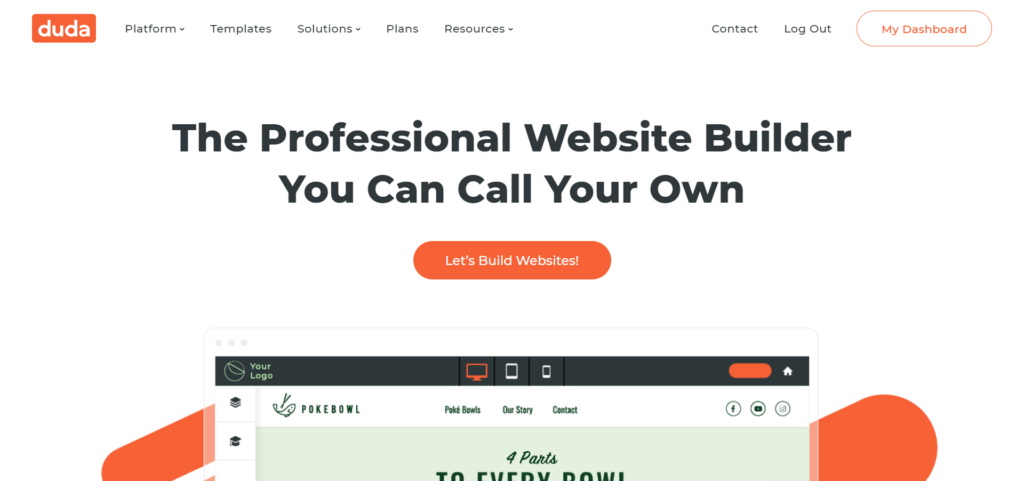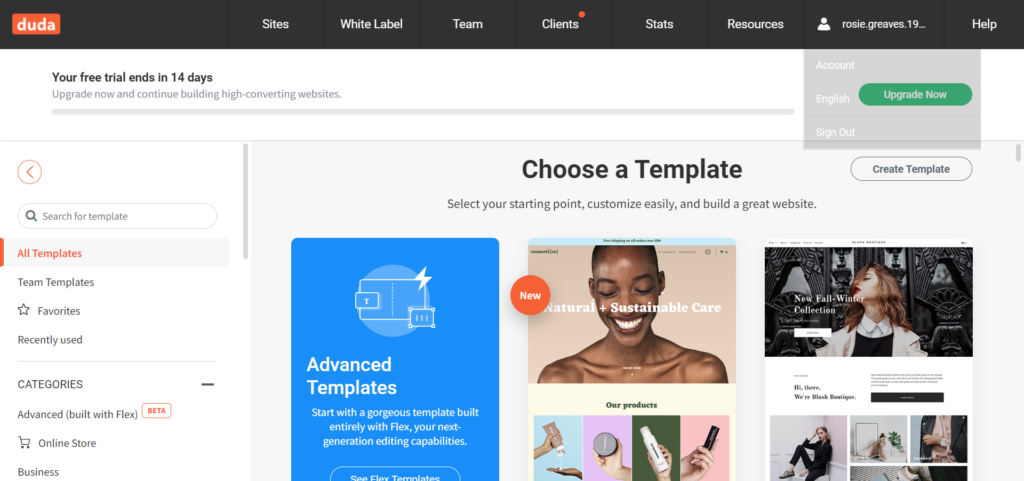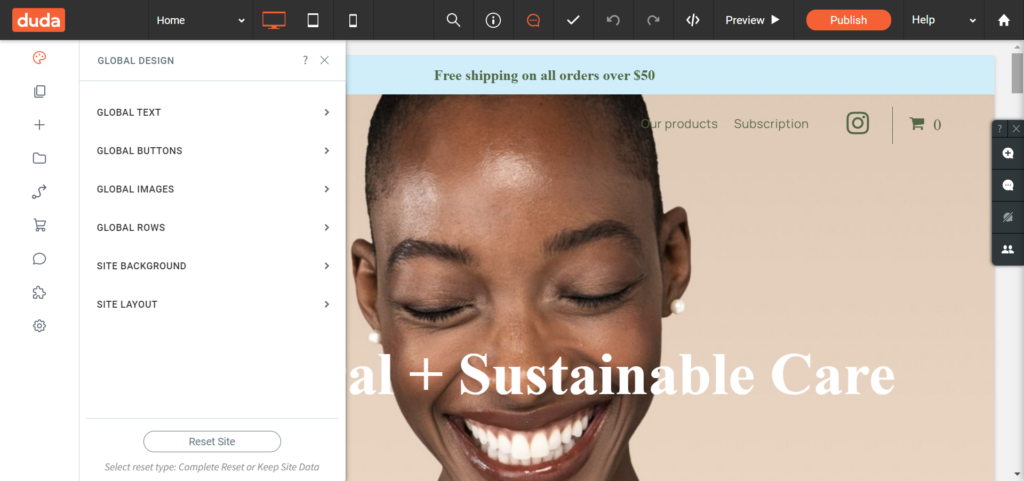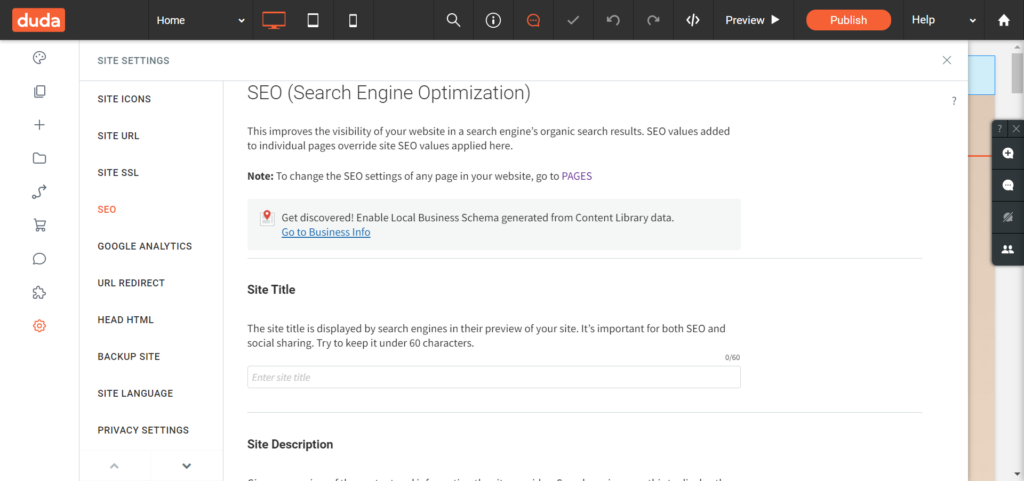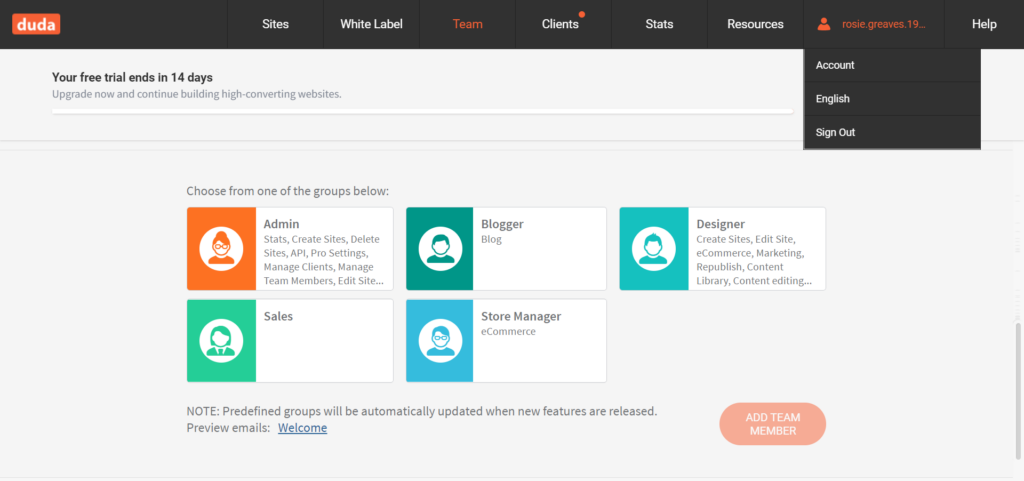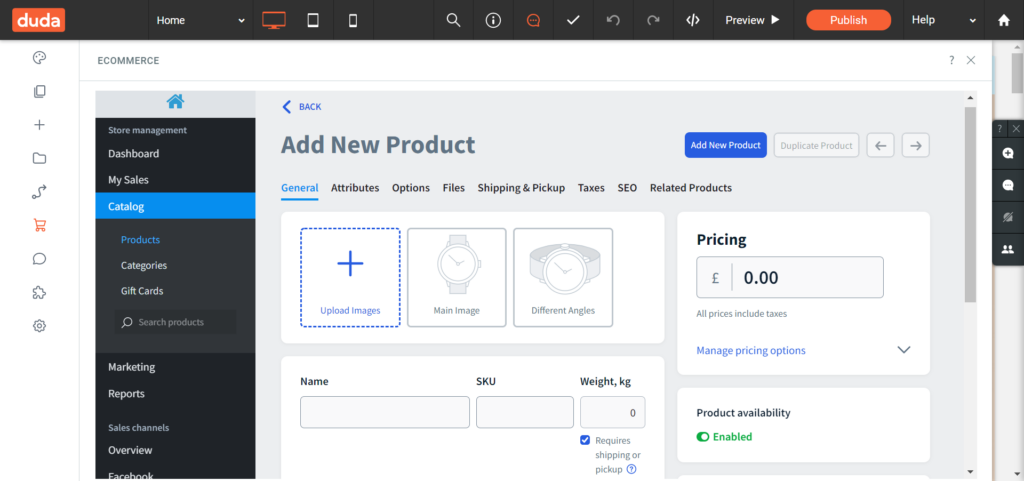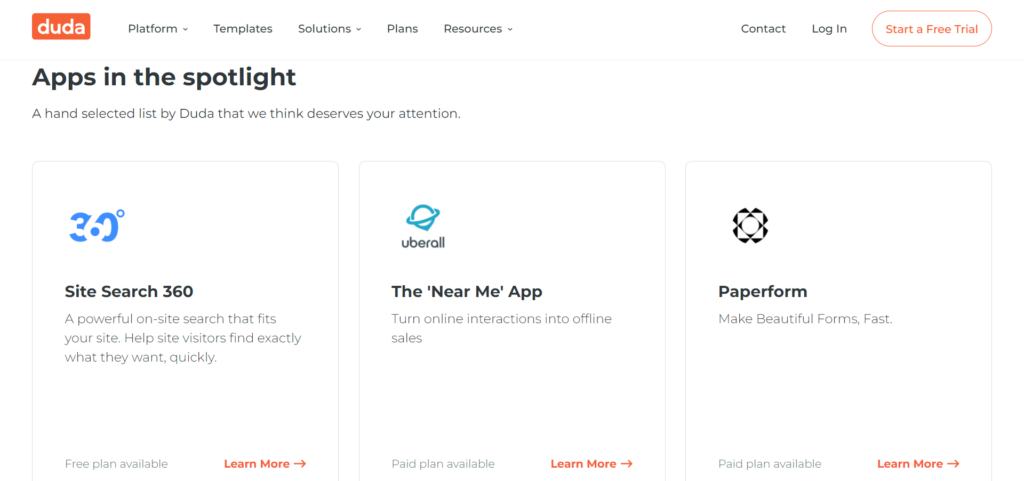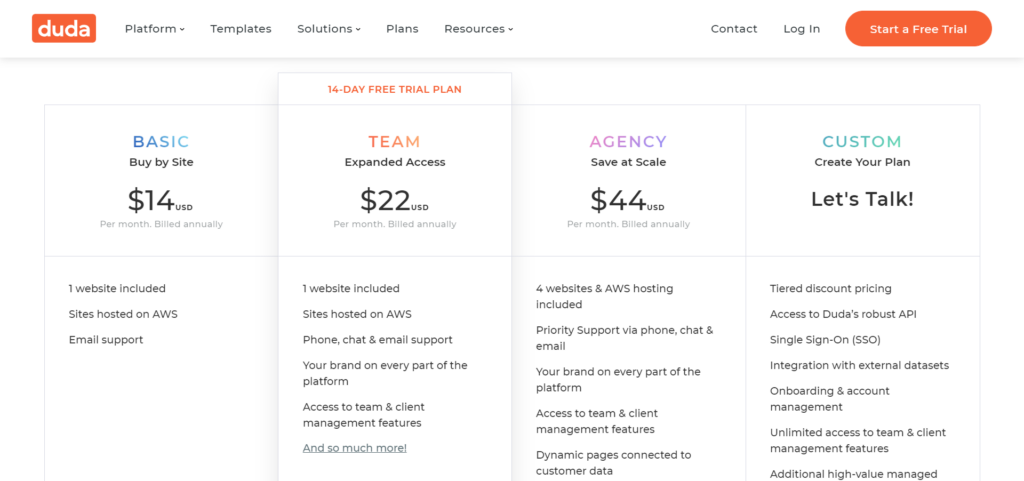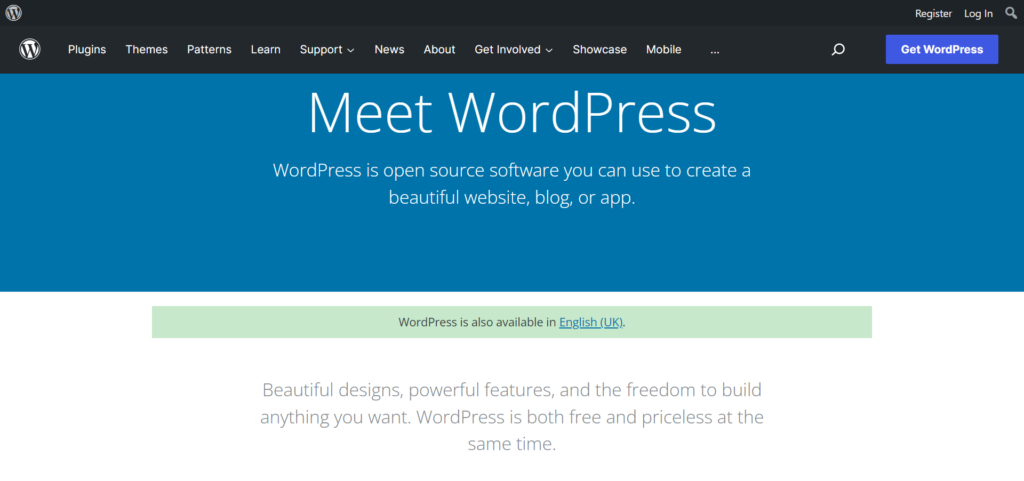Last Updated on April 22, 2023 by Ewen Finser
Many web design platforms offer seemingly simple-to-use solutions for companies and agencies. But unfortunately, because so many options are on the market, identifying the best one for your business becomes somewhat of a challenge.
So, in this Duda review and guide, we’re exploring this platform. There’s lots of information to digest, so let’s get going.
Our Bottom Line Up Front
Duda is an interesting choice for anyone building more than one website and/or earning an income from website creation.
Most notably, Duda offers:
- A generous number of attractive, mobile-responsive website templates
- A staggered and affordable pricing structure including a 25% saving if you pay annually
- An ample number of self-help resources
- Tools that suit both small businesses and organizations needing more than one website
But how do you know if Duda is the right design platform for you? Let’s dig a little deeper…
About Duda
Trusted by over 18,000 SaaS platforms and agencies, Duda is predominantly a web design platform for companies building websites for smaller companies. Its broad customer base includes well-established digital agencies and big hosting companies like GoDaddy, through to smaller online publishers and freelance web design professionals.
Based in California, Duda was founded in 2009, so it’s no new kid on the block. To date, more than 14 million responsive websites have been built using Duda’s platform.
You don’t need a ton of web design experience to use Duda or technical knowledge. Plenty of customizable templates is available, as is an intuitive editor. So you can either build a site with no coding knowledge or dive into your website’s JavaScript, CSS, HTML, and APIs – the choice is yours!
Duda also has an excellent overall review rating on several reputable review sites, which at the time of writing, were as follows:
- Capterra (4.6 out of 5 stars)
- PCWorld (4 out of 5)
- GetApp (4.6 out of 5)
- G2 (4.7 out of 5)
- Google 4.6 out of 5).
Signing Up
To create a Duda account, you need to input your email address and create a password. You’re then sent an activation email containing a link that, when clicked, takes you to a page that doesn’t let you progress unless you tell Duda who you are, i.e., a freelancer, a digital web agency, etc.
You’re also asked to tell Duda how many sites you build a month, from 0 to 10+, and state your job title, i.e., a developer, web designer, etc. Only then can you start your free 14-day trial. At which point, you’re taken through a series of choices about the type of site you want to create. Once that’s done, you can start looking through templates.
It looks like a somewhat protracted process on paper, but it only takes around five minutes.
Duda’s Core Features
Duda offers lots of features. But, here’s our pick of the most stand out ones:
Templates
Duda offers users over 100 contemporary templates to choose from, split into the following categories:
- Online store
- Business
- Events
- Lifestyle
- Travel
- Portfolio
- Restaurant
- Services
- Community
- One pager
There are also ten blank templates for anyone wanting to customize their web pages from scratch. The blank template designs include the following:
- Empty template
- Blank one page
- Blank sidebar
- Blank shop
Best of all, each template can be customized per device (laptop, tablet, mobile). So you can ensure your website looks its best no matter how visitors choose to access it.
Drag and Drop Editor
Once you’ve picked a template, you can use Duda’s drag and drop editor to insert website elements onto your web pages.
For instance:
- Text (over 100 fonts available)
- Images
- Forms
- Widgets
…and so on.
To ensure your website’s completely on-brand, you can also customize your text’s size and format. That’s as well as modify your website’s colors, buttons, page background, etc.
Widgets
You can build new widgets for your site using CSS, HTML, and javascript. But, of course, you’ll need some coding smarts to achieve this. In addition, you can embed your own settings panel into a widget to utilize your creation to the fullest.
The Duda widget builder lets you build your widgets so that updates don’t break existing widgets. As a result, you don’t have to keep returning to fix issues, especially ones that may crop up on old websites.
Search Engine Optimization
All websites are optimized for page speed; load times are reduced using Duda’s global CDN (content delivery network). This hosts files like images, documents, and PDFs on your sites.
Duda also offers a free SSL certificate with its websites. Again, this is easy to install and helps with your SEO rankings. In addition, all websites built on Duda are responsive on any device, and a sitemap is auto-generated. The latter informs search engines which pages to crawl, which, in turn, helps search engines rank your pages accordingly.
You can also customize your website content to make it SEO-friendly. This includes the title of each page, web page URLs, and strategic keyword distribution. In addition, you can also redirect old web page URLs to a new, functioning page.
Assign Teams and Roles
Given Duda isn’t just aimed at individual web designers but also agencies that are building sites on behalf of clients, collaboration features are a must.
Fortunately, you can save any template you’re working on, share it with team members, and/or use it for future projects. You can also build and keep widgets that enhance website functionality and use them repeatedly for different sites.
On top of that, you can assign different permissions to different team members. For example, some team members may be permitted to write and edit blog posts but have no web design control. Alternatively, you can allow colleagues free reign – the choice is yours.
Lastly, you and your team can leave comments on the web pages you’re working on for others to address. This enables smoother collaboration by ensuring hand-overs from one team member to another are simple.
eCommerce
Aside from the aforementioned SEO-optimized templates explicitly designed for online stores, Duda integrates with 40+ payment platforms. That’s as well as eCommerce features like:
- Fast loading home pages
- Mobile-friendly pages
- Abandoned cart email functionality
- The ability to create and distribute coupons and gift cards
If you’re creating an online store on behalf of a client, you can set permissions so that your client can manage their own store. However, you can also restrict what they can and can’t change.
That way, depending on what you’ve agreed with your client, you can ensure your site, your client, and you are protected from your client accidentally changing something crucial.
The website builder also offers a white label option, so Duda’s branding isn’t visible unless you want it to be.
However, it’s worth noting here that Duda treats eCommerce functionality as an add-on – prices start at $7.25 a month for listing up to 100 products, rising to $39 a month for unlimited product listings.
App Store and Integrations
Duda offers 28 integrations, split into five categories:
- Business and site management: including Google Analytics, PayPal, and Google Calendar
- Marketing: including Open Table, MailChimp, and Yelp
- Social networks: including Facebook, Instagram, WhatsApp, and Pinterest
- Collections: including Google Sheets and AirTable
- Video and audio: including Mix Cloud, YouTube, and Vimeo
Here’s a taster of a few other integrations worth mentioning:
- Comparison Tables: Create and display tables that website visitors can compare prices, products, and features.
- Termageddon: Generate policies compliant with GDPR, CCPA, and other privacy laws.
- AMP Faster Websites: Maximize your site’s speed and SEO, and make the most out of Google Accelerated Mobile Pages.
- Chatfully: Offer website visitors support via SMS, webchat, social media DMs, etc.
It’s worth noting that while most apps, including Chatfully and Comparison Tables, offer free plans, there are extra fees to unlock advanced features. In contrast, other apps like Termageddon and AMP Faster Websites only offer paid plans.
Duda Prices
We’ve already mentioned that Duda offers a free 14-day trial. After that, there are four paid-for pricing plans. The quotes below are based on annual billing, including a 25% discount. So if you would prefer to pay monthly instead, just add 25% to the costs:
Basic
This will set you back $14 per month, for which you’ll receive:
- One multi-language website (and $19 a month or $171 a year per additional website)
- Web hosting on AWS (Amazon Web Services)
- Email support
- Access to a library of free images
- Access to Duda’s App Store
- Limited permissions to import content from existing websites (photos, business information)
- Access to Duda’s intuitive website builder
Team
This is the plan you get access to when you start your free trial. When the trial ends, this package costs $22 a month. For this, you receive everything in the Basic plan plus:
- Phone, chat, and email support
- $13 a month or $117 a year per additional website
- Your branding on all web pages
- Team and client management and collaboration features, such as team user permission and shared assets such as templates and site sections
- You can import content from existing sites, including widgets and design elements.
- Register up to fo team members
- Access to Duda experts. These are Duda’s web professionals you can contract for an additional fee to help with your project.
- White label access
- Site commenting for up to 100 clients
Agency
Prices start at $44 a month. So for this, you get all the above and:
- Priority email, chat, and phone support
- $11 a month or $99 a year for each additional website
- You can export your whole site as a Zip file.
- You can create dynamic pages with internal collections to reuse for any number of sites. This allows you to quickly create frameworks for web pages that might change depending on the data they draw on – for instance, real estate listings or product listings.
- Register up to ten team members
- Access to a custom email domain
- Access to advanced tools such as the widget builder
Custom
No prices are published for this bespoke plan. Instead, you’ll have to contact Duda directly for a custom quote.
You’ll receive all the above and:
- A custom number of websites included with the plan
- Custom prices for additional websites
- Dedicated support, including an account manager, website migration assistance, custom development services, and expert API advice
- You can register unlimited team members.
- A custom number of site comments
- Access to advanced tools, including unlimited API calls
Duda’s Pros and Cons
We’ve covered lots of ground, so let’s condense some of what we’ve learned into a quick pro-cons list:
Pros
- Duda boasts a 99.9% uptime.
- You can access real-time platform status updates.
- There’s a free 14-day trial.
- You get a free SSL certificate with each Duda website.
- Access to a wide range of mobile-friendly, customizable templates
- Duda’s white-labeling functionalities make the platform ideal for agencies.
- With dynamic pages, Duda can streamline the design process for information-rich product pages across various industries.
- Collaboration tools like shared assets and commenting allow for better teamwork.
- Duda presents an affordable eCommerce solution.
- Full access to Duda’s REST API and the widget builder make Duda especially developer-friendly.
Cons
- If you’re building websites for multiple clients, Duda gets expensive.
- There isn’t a free plan available.
- With 28 integrations, Duda isn’t the most adaptable tool for your existing tech stack (this is especially true if you don’t have any coding know-how).
- Access to the API is only available on the Custom plan.
Duda Alternatives
When researching any web building platform, it’s worth comparing it against its competitors. That said, below, we’ve listed a few Duda alternatives for your consideration:
Wix
Wix is a popular website builder that’s been around since 2006. Rather than aiming itself at freelancers or agencies building sites for other businesses, Wix focuses more on individuals and smaller companies such as eCommerce store owners, restaurants, etc.
However, it also has an Enterprise package aimed at bigger companies – notable users of which include DHL, Hilton, and Deloitte. In contrast, for individuals looking to build a site, this is doable for free. Wix’s freemium account comes with 500MG storage and limited features. After that, the most basic plan starts at $16 a month (billed annually).
Alternatively, suppose you’re building an eCommerce store. In that case, you need one of Wix’s business plans, of which there are three, starting at $27 a month with annual billing. There’s also an unlimited free plan with Wix ads and a Wix subdomain. Business customers also receive priority 24/7 support.
Like Duda, Wix offers an intuitive drag and drop editor. In addition, every design element is customizable, including font and images. Not to mention, there are over 800 templates to choose from, organized into various categories, including blank templates empowering you to start the web design process from scratch.
Wix websites also come with an in-built SEO toolkit on every plan. Features include:
- Customizable URLs
- A maintained XML sitemap
- Complete control over your meta tags – even though page titles and descriptions are auto-generated, you can still modify them to enhance your SEO.
WordPress
Launched in 2003, WordPress always pops up in reviews like these. Quite simply because so many websites (455 million out of 1.3 billion websites worldwide) are powered by it, including Google, The New York Times, Spotify, and CBS.
WordPress is a free, open-source platform that offers powerful website-building features. There are hundreds of customizable, mobile-friendly themes to choose from.
However, WordPress’s website builder still isn’t as intuitive as some of the others mentioned in this review because it doesn’t offer drag-and-drop functionality. That said, this is easily remedied with the right plugins.
If you decide to move from WordPress, you can export your content and migrate it elsewhere. Like Duda, WordPress offers SEO tools to optimize your sites, such as:
- The ability to modify meta tags and descriptions
- Create custom URLs and redirects
- Modify title formats
- Social previews
…and much more.
Squarespace
Launched in 2004, Squarespace claims to be a “leader in website design.” It’s used by many businesses, including restaurants, Etsy sellers, eCommerce stores, and other business types.
Websites are simple to create using Squarespace’s professionally-designed templates. You just tell Squarespace what type of website you’re trying to develop and your business goals. Then, it’ll offer some suggested layouts which you can customize using Squarespace’s drag and drop editor.
Pages are designed using a grid with fixed columns and rows. This means your design freedom is slightly limited, as elements automatically snap to the closest position on the grid.
SEO tools are built in to help sites achieve prominence in searches. These include the ability to edit page titles and descriptions, social previews, sitemaps, automatic markups, clean URLs, and more. Squarespace also comes with website analytics to help you better understand where your site traffic comes from.
Prices start at $14 a month (annual billing). Still, businesses are usually better served with the Business plan for $23 a month (annual billing) or Squarespace Commerce plans (if you’re selling products). Prices for these plans start at $27 a month (annual billing) and include features such as customer accounts and 0% transaction fees.
The downside to Squarespace is that there’s no free plan, but there is a 14-day free trial. Also, the grid design system can be a bit challenging if you’re more in favor of a free-form style approach. On the other hand, its templates are some of the most attractive in this review.
FAQs
Question: If I Use Duda to Create Websites, do I Also Have to Use it to Host my Websites?
Answer: Every website you build using Duda is hosted on its servers. Hosting is provided by Amazon Web Services (AWS). This (according to Duda) guarantees a 99.9% uptime.
However, you can import code from Duda to a different hosting platform, but only if you pay for the Agency or Custom plan.
Question: What about Bandwidth and Storage Limits? Are There Any?
Answer: Unlike some of its competitors, there are no bandwidth or storage limits.
Question: What Self-Help Resources does Duda Offer?
Answer: Aside from the support mentioned above, Duda offers several resources, including:
• Webinars: topics such as how to stand out from the crowd of other agencies and run an SEO audit to boost site traffic are covered.
• Duda University: here, you’ll find a wide selection of courses covering marketing, SEO, design, development, and eCommerce basics
• Blog: there are informative posts on SEO, adding videos to sites, SaaS metrics, etc.
• Marketing materials: You’ll find eBooks on website migration, upselling, GDPR, white-label tutorials, etc.
That’s as well as a Developer portal (where you’ll find thorough API documentation), access to Duda experts on higher paid plans, and an online community. With the latter, you can post questions and read about tips and comments from other users.
Question: Is Duda only for Agencies and Big Companies?
Answer: No. Duda is also a good option for freelance web designers building sites for small businesses and solopreneurs needing to quickly launch a site.
Duda Review and Guide: Our Final Verdict
All in all, Duda has a great selection of beautiful templates, scalable prices, and good team collaboration tools. In addition, we like that it offers a free 14-day trial, an extensive online resource center, and different levels of customer support, depending on which plan you’re on.
Templates are customizable and easy to edit. On top of this, if the drag-and-drop editor doesn’t provide sufficient design freedom, you can access your website’s HTML and CSS for more granular control.
However, some cons worth considering include a lack of integrations – this is especially true for newsletters, as you’re limited to Mailchimp. Plus, those looking to develop Duda further with their own tech stack will need to invest more to access the API.
However, for us, the pros outweigh the cons. We especially love its white-label tools that ensure your brand remains at the forefront of everything you do with Duda.
So, there you have it. We’re finally at the end of our Duda review! Tell us how you got on with your 14-day free trial and if you think Duda is the platform for you. Likewise, tell us if you think you might explore one of the alternatives mentioned here. Speak soon!


